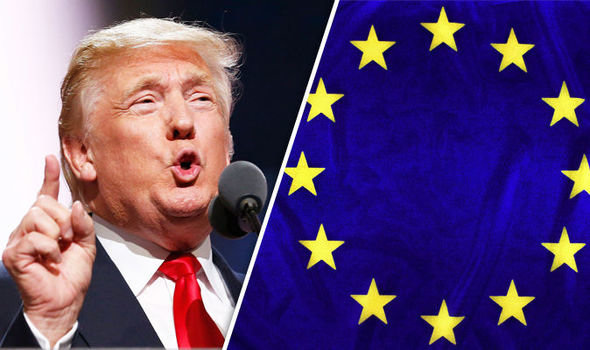Trump seeks to split EU as fight intensifies over Iran nuclear deal

It's Warsaw and Washington against the big EU powers, as U.S. President Donald Trump's administration pushes to kill the Iran nuclear deal — and to exploit European divisions on foreign policy in the process.
Of all the damage Trump has done to transatlantic relations, no issue has divided the U.S. from its European allies as starkly as the dispute over the Iran accord, known as the Joint Comprehensive Plan of Action (JCPOA).
The fight is about to heat up.
EU officials this month plan to approve and register in France a "special purpose vehicle" aimed at helping European companies to continue doing business with Iran and circumvent the sanctions Trump unilaterally reimposed on Tehran last year.
Final preparations for the special purpose vehicle will be discussed by EU foreign affairs ministers in Brussels on Monday, where they are also working to develop broader conclusions on Iran to be adopted at an EU leaders' summit in March.
The refusal of the EU, and the three European guarantors of the JCPOA — France, Germany and the UK — to fall in line behind Trump's pullout from the deal has enraged the president and his administration.
Escalating the dispute, U.S. Secretary of State Mike Pompeo, who has railed recently against the EU and other multilateral organizations, will hold a conference in Poland next month on Middle East peace that will put a spotlight on tensions between Warsaw and Brussels, including on foreign policy.
The European Commission has initiated so-called Article 7 disciplinary proceedings against Poland over alleged rule-of-law violations.
The EU's high representative for foreign affairs, Federica Mogherini, has already said that she will not attend the conference in Warsaw, citing a scheduling conflict. And EU officials said they have not yet decided if lower-level officials would be sent in her place.
Asked about the conference, a spokeswoman for the European External Action Service, the bloc's foreign policy arm, was noticeably unenthused. "As far as we understand this is a conference on the Middle East, the exact title says it's the ministerial to promote a future of peace and security in the Middle East," said the spokeswoman. "So I don't have a particular further comment on it."
While Warsaw seems an unlikely location for such a gathering, the conference scheduled for February 13-14 will give Pompeo a platform to press the Trump administration's Middle East policies ahead of the annual Munich Security Conference in Germany. Pompeo toured the Middle East in recent days, including a stop in Cairo, where he gave a speech bashing Iran and former U.S. President Barack Obama as two of the main causes of instability in the region.
Poland is expected to describe plans for the conference during Monday's meeting of foreign affairs ministers. EU diplomats declined to comment publicly on the event, referring questions instead to their Polish counterparts. But privately diplomats and officials expressed annoyance at what they described as a transparent effort by Warsaw to cozy up to Trump — at the evident expense of EU unity.
Iran has also reacted furiously to the conference, with its foreign minister, Mohammad Javad Zarif, deriding the event as a "desperate anti-Iran circus."
In Poland, some analysts said the government was largely caught off-guard by the Trump administration's plans and is unwisely being drawn into a feud with little upside for Warsaw.
“We are in the position of being America’s foreign policy subcontractor,” said Marcin Zaborowski, of the Warsaw-based Visegrad Insight foreign policy think tank. He said that Pompeo’s announcement, which was first made during a Fox News television interview, had prompted a scramble by Polish officials to catch up with the American initiative.
“It was done and communicated in a terrible fashion," Zaborowski said.
Polish diplomats were also called to account in Tehran, endangering ties that have warmed in recent years.
“Iran is a potential source of diversifying our energy away from Russia,” Zaborowski said. “That’s all been damaged now.”
After its top diplomat in Tehran was summoned to a meeting at the foreign ministry, the Polish government issued a statement defending its decision to host the conference. "In our view, the international community has the right to discuss various regional and global issues, and Poland [has the right] to co-organize a conference, whose goal is to develop a platform for actions promoting stability and prosperity in the Middle East region."
The Polish government has offered Trump perhaps the most support of any EU country. And Polish officials have even pitched to Trump the idea of establishing a permanent U.S. military base in the country that they said might be named Fort Trump.
Trump has said he is "strongly considering" the idea.
The EU's ability to push back on the U.S. sanctions is limited given that many companies are already complying for fear of losing access to the bigger and more lucrative U.S. market.
But the special purpose vehicle will preserve at least some economic activity, officials said, and it is viewed as an extremely important symbolic step for the Iranian government — allowing it to answer domestic critics who say that Iran should retaliate by abandoning the deal.
Some U.S. diplomats have mocked the EU's efforts to preserve the Iran deal, saying it is only a matter of time before the agreement collapses. But European officials insist that the deal is serving its intended purpose of curbing Iran's nuclear program and cite more than a dozen inspections by the International Atomic Energy Agency that have found Iran in compliance.
(Source: Politico)
